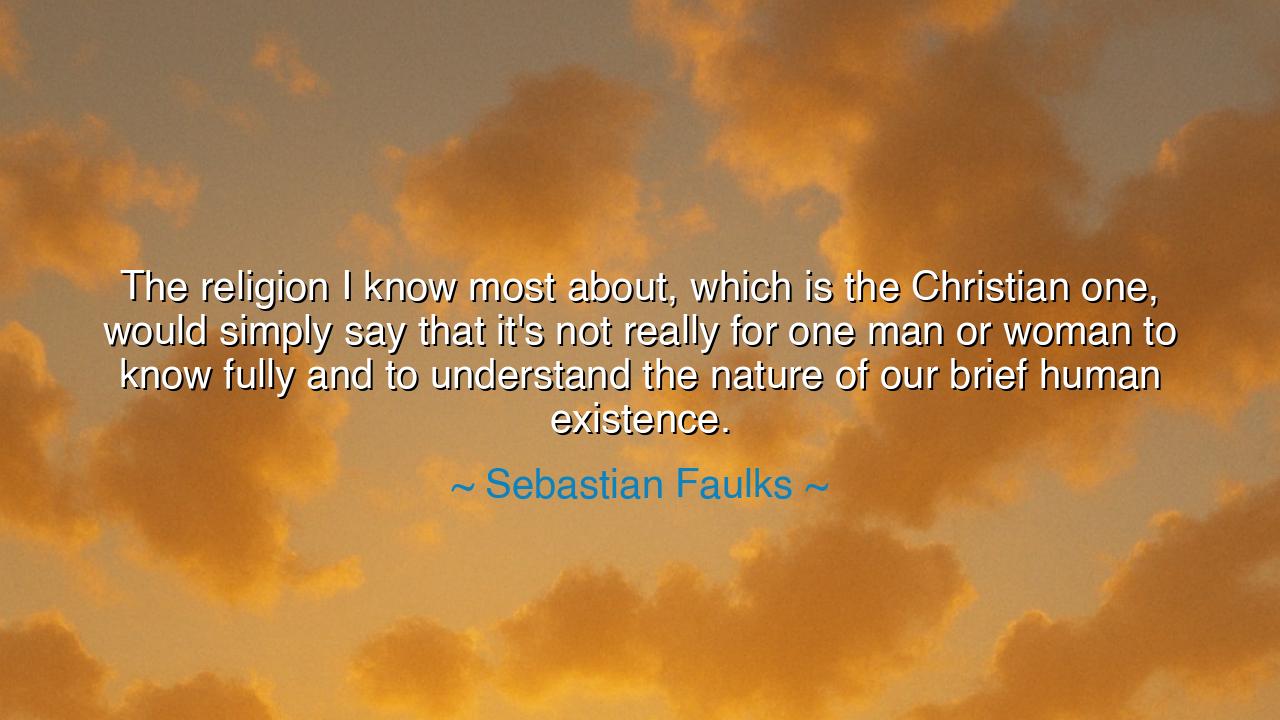
The religion I know most about, which is the Christian one, would
The religion I know most about, which is the Christian one, would simply say that it's not really for one man or woman to know fully and to understand the nature of our brief human existence.






"The religion I know most about, which is the Christian one, would simply say that it's not really for one man or woman to know fully and to understand the nature of our brief human existence." – Sebastian Faulks. These words, spoken by Faulks, delve into the humbling limitations of human understanding. The Christian tradition, as Faulks notes, teaches that while we are granted glimpses into the divine and the mysteries of existence, the full comprehension of life’s purpose and the nature of our brief existence is beyond the grasp of any one individual. The very nature of human existence—with its fleeting moments and its profound questions—remains a mystery, not to be fully understood by any mortal, but to be lived and experienced with faith, humility, and awe.
In the ancient world, the search for meaning was central to philosophy and spirituality. Socrates, the great Greek philosopher, acknowledged that true wisdom was in understanding one’s own ignorance. He famously stated, “I know that I am intelligent, because I know that I know nothing.” Socrates, like many of the ancient sages, believed that humanity's limitations were inherent to our nature, and that we should approach life with a deep sense of humility and curiosity. Much like Faulks’ interpretation of Christianity, Socrates recognized that the mysteries of life and existence were beyond the complete comprehension of any individual, and that to seek wisdom was not to find all the answers, but to ask the right questions with reverence.
In the Christian tradition, humility is a central theme, especially when confronting the vastness of divine wisdom and the mystery of existence. The Bible itself offers numerous passages that acknowledge the limits of human understanding. In the book of Job, when Job questions the suffering he endures, God answers him not by providing all the answers, but by revealing the vastness of the universe and the divine will that is beyond human comprehension. God speaks to Job in a voice from the whirlwind, asking, "Where were you when I laid the earth's foundation?" This passage reminds us that our finite minds cannot fully grasp the infinite mysteries of the universe. Faith, rather than knowledge, becomes the means by which we live with these questions, finding meaning not through answers, but through our journey.
Consider the example of Saint Augustine, one of the greatest Christian theologians. In his confessions, Augustine wrestles with the mystery of God’s nature and the human soul. He writes eloquently of the struggle to understand God’s eternal plan, and the limitations of human reasoning in the face of the divine. For Augustine, the key to understanding was not in grasping the fullness of divine knowledge, but in living a life of faith, trust, and humility. Augustine embraced the mystery of God, accepting that the divine will cannot be fully understood by human intellect, yet through devotion, love, and service, he found peace with that mystery.
In our own lives, the lesson that Faulks imparts through his reflection on Christian thought calls us to recognize that understanding the full meaning of life—the nature of our existence, our suffering, and our purpose—is not something that we can achieve through intellectual effort alone. The nature of human existence, in all its brevity and complexity, is ultimately a mystery, one that invites us to live with faith, acceptance, and humility. The pursuit of truth is not about claiming to possess all the answers but about cultivating a deep respect for the mysteries that lie beyond us.
Thus, we are called to live within the mystery of our brief human existence, to walk through life with curiosity and wonder, but also with the knowledge that there are limits to our understanding. This does not mean we should abandon our search for wisdom, but rather that we should approach it with a humble heart, accepting that the ultimate truths of life, death, and the divine are not fully accessible to us. In embracing this mystery, we are freed from the burden of having to know everything and can instead focus on living with purpose and meaning, guided by faith, service, and the knowledge that life’s greatest answers are often found not in our minds but in our actions.
Therefore, let us seek wisdom with humility, recognizing that the true essence of life is not something that can be fully understood, but something that must be lived. Let us embrace the mystery with open hearts, trusting in faith and living in the present with purpose and love. For, as Faulks reminds us through his reflection on Christianity, it is not the answers that define us, but the way we live and love in the face of the unknowable.






AAdministratorAdministrator
Welcome, honored guests. Please leave a comment, we will respond soon